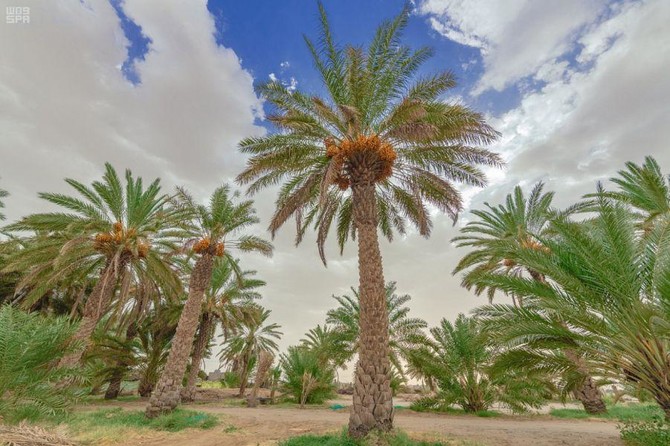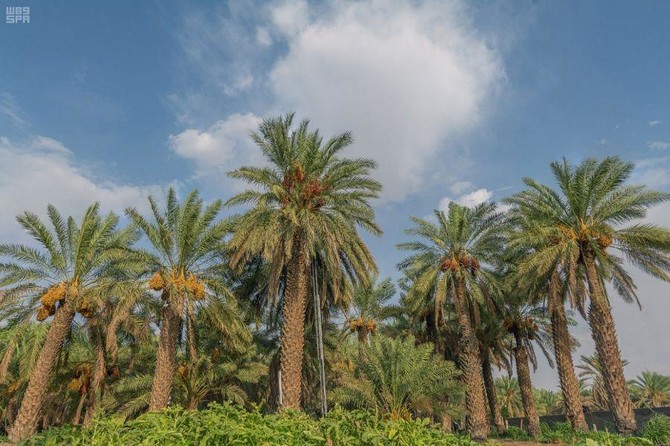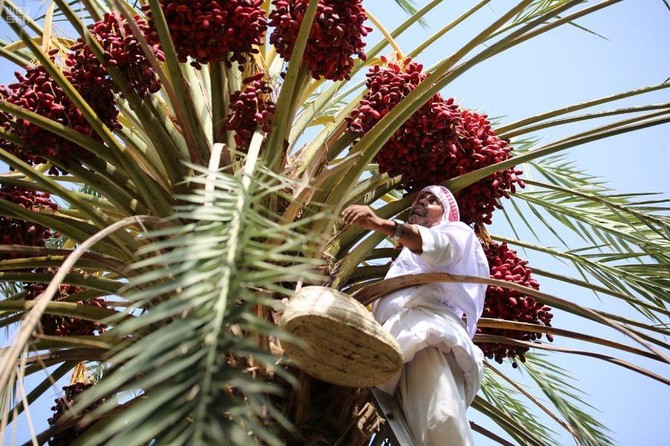JEDDAH: Bisha province is a rich oasis in the southwest of Saudi Arabia that has always been known for its fertile land. It joins between the valleys coming from the high mountains, called Palm Bisha, Green Bisha and Black Bisha, where another 45 sub-valleys also meet.
With the recent agricultural reawakening in Saudi Arabia, the General Directorate of Agriculture has started to rehabilitate the agricultural sector with expert farmers. It is protecting the date palm from various diseases, namely the red palm weevil and others.
The director of the Ministry of Environment in the province of Bisha, Salem Al-Qarni, said palm trees in the province are free of all pesticides and are fully organic, stressing that cooperation with the farmers and addressing all pests was one of the most important factors for the safety and productivity of the palms. He noted that Bisha is famous for the diversity of its trees spreading along the edges of its valleys.
Bisha relies on the rainwater falling on the western and southern mountains, as well as on the city’s highlands. Because of the importance of different sources of water, the Ministry of Environment, Agriculture and Water worked on creating four dams to ensure the permanent existence of water to guarantee the stability of the agricultural sector.
Bisha provides the local markets with many products such as dates, citrus products and honey. However, it lacks proper marketing for external exportation, which contributes to the significant decline of the products’ value.
Within the framework of the Economic Forum for Dates in Bisha, the province worked with the partnership of Bisha University, the National Center for Palm and Dates, and the Chamber of Commerce and Industry on promoting date production to ensure a proper market value that supports the farmer and enhances the resources.
The Sufri product is known to be the best produced locally and is in high demand from many companies. The statistics center at the Sufri Bisha festival recorded that more than 1.9 million palm trees are highly productive in Bisha, producing around 40 percent of exported dates from the KSA to the world.
1.9 million Sufri palm trees in Bisha enhance economic resources
1.9 million Sufri palm trees in Bisha enhance economic resources

How Saudi schools are using AI to personalize learning and streamline administration

- AI tools help students with disabilities through speech-to-text, adaptive interfaces, and screen-reading technologies
- Educators’ roles are evolving as AI handles tasks like grading and performance tracking, freeing teachers to focus on mentoring
RIYADH: As Saudi Arabia forges ahead with its Vision 2030 initiative, artificial intelligence is becoming a cornerstone of its education reform.
Across the Kingdom, AI technologies are reshaping classrooms — personalizing learning, streamlining administration and helping students of all abilities engage with their studies in new ways.

“AI technology has significantly changed the way many students, including myself, approach studying and managing coursework,” Abdullah Mohammed, a law student at Imam Mohammad ibn Saud Islamic University, told Arab News.
“Tools like AI tutoring systems and study apps have made learning more efficient, personalized and accessible.”
While Mohammed said AI tools have enhanced his learning experience, he also acknowledged the need for caution.
“Some AI tools provide quick solutions without much depth, so if I’m not careful, I might miss the critical thinking part of the learning process,” he said.

Ultimately, however, Mohammed said he is confident AI has better prepared him for the job market.
The strategic alignment between AI and Vision 2030 is clear, according to Abdulrahman Al-Motrif, professor of information technology and educational computing at King Saud University.
“AI supports the goals of Vision 2030 by enabling personalized learning, optimizing resource management and facilitating access to quality education regardless of geographic location,” he told Arab News.
“AI systems can analyze student performance in real-time, allowing educators to tailor instruction to individual learning needs, thereby enhancing student outcomes and supporting the Kingdom’s ambition to cultivate a future-ready workforce.”
Al-Motrif also highlighted AI’s role in promoting inclusive education.
“AI reinforces Vision 2030’s emphasis on equity, accessibility, and lifelong learning by reaching remote communities and students with special needs,” he said.
This demonstrates AI’s impact not just as a technological innovation, but also as a powerful force for social transformation.
Leading platforms like Alef Education and Classera are already putting this vision into practice. Using real-time analytics, they adapt content to each student’s learning style, proficiency and pace.

A study by Alef Education found that students using AI-enhanced platforms achieved a 25 percent improvement in academic performance over just one semester — strong evidence of AI’s ability to boost outcomes through personalized learning.
Crucially, AI is helping make education more accessible. In Saudi Arabia’s diverse learning landscape, tools such as speech-to-text software, adaptive interfaces and real-time assessments are opening doors for students with disabilities.
At King Saud University, collaborations with AI developers have produced tools for visually impaired students, converting written content into audio and using advanced screen-reading technology.
“AI has transformed the learning environment into a more interactive and engaging space,” said Al-Motrif. “Gamified learning platforms and intelligent tutoring systems provide immediate feedback and customized challenges.”

These innovations not only enhance academic performance, but also spark motivation and sustained engagement among learners.
AI is also streamlining back-end operations. Platforms like Madrasati now use AI to monitor attendance, track engagement and assess academic progress, freeing educators to focus more on teaching and mentoring.
Yet AI is not replacing teachers — it is redefining their roles.
“In AI-supported classrooms, educators serve as facilitators, mentors and human connectors in an increasingly digital ecosystem, using AI-generated insights to identify learning gaps,” said Al-Motrif.

Still, challenges remain. One significant obstacle is the shortage of Arabic-language content online — making up only 1.2 percent of global digital resources — which limits the effectiveness of AI systems trained on data-rich environments.
To fully realize AI’s benefits, Saudi Arabia must invest in digitizing traditional materials, promoting Arabic content creation and partnering with AI firms to develop language-specific algorithms.
Some institutions are already leading the way. Imam Abdulrahman bin Faisal University and King Abdulaziz University have adopted AI-powered systems to personalize instruction and track student performance, leading to higher satisfaction and retention rates.
These successes show that AI is not merely a technological upgrade — it is a catalyst for reimagining education.

By leveraging AI thoughtfully, Saudi Arabia has a unique opportunity to deliver high-quality, personalized and inclusive education while advancing its Vision 2030 goals.
But achieving this future will require more than just technology. It will demand investment, collaboration and a commitment to ensuring that innovation, pedagogy and policy move forward together.
With sustained effort, AI could become the foundation of a dynamic, future-ready education system — one that prepares all learners for the opportunities of the digital age.

Saudi FM discusses issues of common interest with Peruvian counterpart

RIYADH: Saudi Foreign Minister Prince Faisal bin Farhan received his Peruvian counterpart Elmer Schialer Salcedo and the country’s Minister of Mines and Energy Jorge Montero in Riyadh on Thursday.
During the meeting, Saudi-Peruvian relations, aspects of joint cooperation in various fields, and a number of international issues of common interest were discussed, Saudi Press Agency reported.
Cameroon joins Islamic Military Counter Terrorism Coalition

- Cameroon becomes 43rd member state of the Saudi-led coalition
The Islamic Military Counter Terrorism Coalition announced that Cameroon has officially joined, becoming the 43rd member state of the coalition, led by the Kingdom of Saudi Arabia.
The step underscores a growing commitment to combating terrorism and fostering regional and international security and stability, the Saudi Press Agency reported on Thursday.
The announcement was made during an official ceremony at the coalition’s headquarters in Riyadh, where the flag of Cameroon was raised alongside the flags of the 42 member states; a powerful symbol of unity and solidarity in the fight against terrorism.
The event was attended by Maj. Gen. Mohammed bin Saeed Al-Moghedi, acting secretary-general of the IMCTC, Iya Tidjani, Cameroon’s ambassador to Saudi Arabia, the Cameroonian representative to the coalition, a delegation from Cameroon’s embassy, and representatives of member states.
Al-Moghedi welcomed Cameroon’s admission to the coalition, describing it as a significant step that strengthens joint efforts to combat terrorism and enhances coordination and integration in the intellectual, media, financial, and military fields.
Makkah Municipality approves 3,149 housing permits for Hajj

- This step comes as part of the ongoing efforts to provide pilgrims with a safe and comfortable housing environment
MAKKAH: Makkah Municipality approved 3,149 official housing permits for this year’s Hajj season, following the completion of all required technical and regulatory conditions.
This step comes as part of the ongoing efforts to provide pilgrims with a safe and comfortable housing environment.
The municipality said that the main technical and regulatory requirements include: ensuring compliance with building permits and approved architectural plans; reviewing safety reports, emergency staircases and generators; verifying maintenance contracts and training workers on safety standards; reviewing and approving the establishment’s records and ensuring their consistency with aerial photographs; and fully complying with safety forms among others.
Makkah officials continue efforts to ensure the highest degrees of technical and regulatory readiness to provide the best possible experience during this year’s pilgrimage.
6,000 Qur’an copies distributed at Tunisia Book Fair

- At the Kingdom’s pavilion, visitors can browse an extensive collection from the King Fahd Complex for the Printing of the Holy Qur’an, including translations of Qur'anic meanings and editions in different narrations and formats
RIYADH: The Saudi Ministry of Islamic Affairs, Dawah and Guidance has distributed more than 6,000 copies of the Qur’an to visitors at the 39th Tunisia International Book Fair.
The distribution began when the fair started on April 25, the Saudi Press Agency reported. The fair will run until May 4.
At the Kingdom’s pavilion, visitors can browse an extensive collection from the King Fahd Complex for the Printing of the Holy Qur’an, including translations of Qur'anic meanings and editions in different narrations and formats.
Visitors to the pavilion can also experience a range of interactive electronic applications that provide educational content and religious services.
Among the highlights are a 3D Hajj and Umrah application, a correct citation application, and virtual reality experiences that offer immersive tours of the Grand Mosque in Makkah and the Prophet’s Mosque in Madinah.
The ministry’s participation underscores Saudi Arabia’s commitment to serve the Qur’an and support Islam and Muslims worldwide.






















